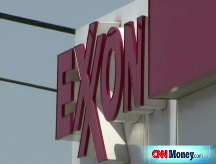Americans finger oil firms for gas runup
Americans see U.S. oil companies and foreign producers as key drivers of high gas prices. Congressional Democrats are not seen as a major cause.
NEW YORK (CNNMoney.com) -- Americans see big oil companies and overseas oil producers as the top culprits responsible for high gas prices, according to a poll released Thursday.
Based on telephone interviews with more than 1,000 adult Americans conducted in July, the CNN/Opinion Research poll found that 68% of respondents think U.S. oil companies are a major cause behind high gas prices.
The results come on the same day that Exxon Mobil (XOM, Fortune 500), the world's biggest publicly traded oil firm, reported the largest quarterly profit in U.S. history. (Full story).
A majority of Americans think that, after U.S. oil companies, foreign oil producers are driving gas prices higher. The poll found that 65% of respondents think overseas producers are a major factor.
Poll respondents also tabbed financial "speculators" (57%), rising demand from other countries like China and India (56%), Bush administration policies (54%), the war in Iraq (51%) and federal laws banning drilling in offshore and wilderness areas (51%).
On the other hand, only 31% of those polled think congressional Democrats are a significant cause of high gas prices - 43% termed the Democrats a minor cause, and 26% said they are not a cause at all.
"The opinion poll reflects a correct gut instinct by consumers," said Dr. Mark Cooper, research director of the Consumer Federation of America. Though he added that the situation is "more complex than that."
"OPEC and oil companies make outrageous profits," he said. And the relationship between the two contributes to an "upward spiral" in the crude market, which ultimately impacts the price of gas.
Still, there are other factors impacting the price of crude oil, which makes up 70% of the price that consumers pay at the pump, according to Chris Lafakis, Associate Economist at Moody's Economy.com.
Lafakis said "global supply-and-demand fundamentals" is the primary factor driving oil prices higher.
"Crude is a global commodity," he said. And "explosive" demand growth in emerging economies "more than compensates" for a recent drop in U.S. demand.
Supply, meanwhile, is "very thin" and new sources of crude are scarce, Lafakis said.
In addition to supply-and-demand issues, oil prices are being pressured by the weak dollar, speculative investment and "geopolitical risk factors," he said.
The margin of sampling error for results based on the the total sample is plus or minus 3 percentage points. ![]()





